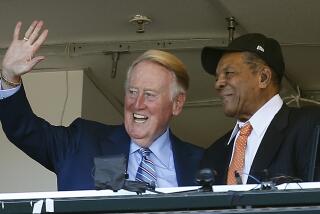John Sculley’s Planting Seeds for New Media, Net Ventures
- Share via
SAN FRANCISCO — In May 1993, John Sculley was chairman of Apple Computer, a friend of Bill (as in Clinton) and some people’s technology visionary du jour. Just eight months later, he was an out-of-work executive who’d embarrassed himself by going to work for a tainted Long Island company and was now being held responsible for the ruination of Apple.
It was a remarkably precipitous fall. But now Sculley is trying once again to be a player in a technology industry that’s always regarded him with suspicion. He’s made investments in six start-ups, all in the Internet/new-media arena, and is chief executive of one of them, Live Pictures, which creates software for editing and manipulating digital images.
He fancies himself the creator of a Silicon Valley keiretsu, the Japanese word for a collection whose interests are intertwined.
Jetting between his New York City home and California as often as several times a month, Sculley these days seems invigorated. In a recent interview, he gleefully demonstrated the virtual grocery store created by Real World, a company started by former Apple engineer Eric Chen and acquired by Live Pictures earlier this year, and he noted that the same software was used by Live World, an Internet “community” started by former Apple marketing man Peter Friedman and bankrolled in part by Sculley.
Seismic Entertainment, another Sculley-financed venture started by his son Jack and daughter-in-law Terry Brooks, designs electronic tours of exotic locales featured on Live World. Net Objects, started by ex-Apple engineer Samir Arora, makes software tools for creating Internet content and was used for part of Live World’s Web site.
“I think of myself as a venture catalyst,” Sculley said. “I’m essentially a builder. What builders look for is a great opportunity and smart people and then remove the obstacles for them so they can get on with doing it.”
Unless he succeeds spectacularly with his new ventures, though, Sculley is likely to be remembered not for what he built, but for what he didn’t build at Apple. When asked about the company’s current travails, Sculley at first gets a faraway look in his eyes, then launches into the defense he’s offered many times to friends but rarely in public.
“Apple is a cult and not a company,” Sculley said, the frustration of trying to harness the company’s creative but undisciplined engineers evident in his voice. “It was very hard for me as a professional manager to come in later and try to change that culture.
“Steve [Jobs] created the culture at Apple, so maybe it’s good that he’s back,” he said.
Jobs, who lured Sculley to Apple in 1984, became his rival for control of the company, and finally his enemy when Sculley squeezed him out in one of the most publicized breakups in the history of business.
Sculley said with just a trace of sarcasm, “I hope he’s wildly successful.”
Sculley’s reluctance to discuss Apple seems to derive as much from ambivalence as from discretion. As he reaches for the right words, speaking in measured fragments and pausing repeatedly, he appears to be grappling with unruly emotions.
During his tenure at Apple, Sculley was hailed for saving the company from bankruptcy and reviled for ill-advised moves such as appointing himself head of research and development and launching the Newton, a hand-held computer with flawed handwriting-recognition software. The critics said Sculley, the marketing man and professional manager, was trying to emulate Jobs, the technology visionary.
The criticism from those years still stings.
“Apple was booming at the end of 1992 when I handed it off to someone else,” Sculley said. “Apple had the biggest market share it has ever had before or since; it had $2 billion in cash and no debt. We had one bad quarter, and I got slammed for it.
“It’s never been run so well,” he said.
After being ousted as chairman and chief executive by the Apple board, Sculley several months later astonished observers by signing on to head Long Island-based Spectrum Information Technologies.
The company claimed to have key patents for wireless communications technology, but mostly what it had was a history of questionable stock promotion and ties to dubious characters--all of which was well-known at the time. Sculley bailed out a few months later, but the damage to his reputation was done. (Peter Caserta, the Spectrum executive who persuaded Sculley to join the firm, later pleaded guilty to mail fraud in connection with another company.)
A Sculley acquaintance, an investment banker who declined to be named, said the move still baffles.
“He could have called me and I could have told him what Wall Street was saying about those guys,” he said. “I don’t know why he never made the call.”
“It was weird,” son Jack Sculley said of the decision. “He never asked anyone about it.”
Sculley is reticent on the subject of Spectrum. “If I’ve made mistakes, it was trusting the wrong people,” he said. “I was totally burned out when I left Apple. When you get burned out, you lose your judgment and you lose your confidence. That’s the worst part--losing your confidence.”
After Spectrum, Sculley spent months recharging. “I had to figure out why things weren’t going right,” he said.
He spent much of his time reading books--on physics, new trends in education and the fledgling Internet craze.
Eventually he hooked up with his two younger brothers--Arthur, who headed the private banking division at J.P. Morgan & Co. before retiring two years ago, and David, who had run H.J. Heinz Co.’s food operations--and set up Sculley Bros. Investments in an East Manhattan high-rise.
“I thought the next era would not be about big companies,” Sculley said. “I wanted to be in a position to help these entrepreneurs. I thought about raising a fund, but I didn’t want the responsibility of investing someone else’s money.”
While his brothers wound up turning to more traditional investments, Sculley gravitated to the creative, technical types who had both fascinated and frustrated him at Apple.
Today Sculley is savoring his role as counselor to a generation of promising young entrepreneurs.
“I can’t say there’s been a master plan,” he said. “These are really the best days. I’ve got it all now.”






